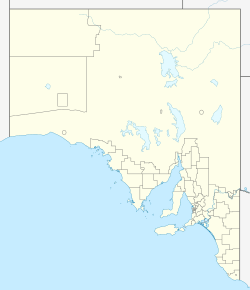Boston Island facts for kids
|
Location in South Australia
|
|
| Geography | |
|---|---|
| Location | Spencer Gulf |
| Coordinates | 34°42′S 135°56′E / 34.700°S 135.933°E |
| Administration | |
|
Australia
|
|
Boston Island is a private island in South Australia. It's about 960 hectares big and sits in Boston Bay, which is part of the Spencer Gulf. For a long time, people mostly used the island for grazing sheep. There were also plans for a town called Kerrillyilla on the southern end, but it was never built.
In 2009, the island's rules were changed to allow for new homes and tourism projects in the future. At that time, the island was owned by Peter Davis, who used to be the mayor of Port Lincoln. His plans included building up to 1,000 homes, three tourism spots, and a small harbor inside the island.
Contents
Island Features
Boston Island has several interesting spots. The northernmost tip is called Maria Point, and the southernmost is Point Fanny. The westernmost point is Hayden Point. Point Fanny got its name from Fanny Conway, a friend of Lady Gawler, whose husband was Governor Gawler. The Governor promised to name the point after Fanny when her tent fell down while she was camping there!
The island's longest beaches are Squeaky Beach in the north and Homestead Beach in the north-west. Picnic Beach on the east side and Cemetery Beach on the central west coast are smaller. There's also a bay between Point Fanny and Hayden Point called Rotten Bay. In 2010, people tried to change its name to Bluefin Bay or Fishdance Bay, but the public didn't agree. It's thought the name "Rotten Bay" came from how difficult it was for boats to anchor there.
Amazing Wildlife
Boston Island and the waters around it are home to many cool animals that need protection. These include birds like the bush stone-curlew, pied oystercatcher, sooty oystercatcher, fairy tern, eastern osprey, and white-bellied sea eagle. You might also spot marine mammals like the Australian sea lion, New Zealand fur seal, and even the huge southern right whale.
Little Penguin Colony
Did you know there were penguins on Boston Island as far back as 1915? In 2006, a small group of less than 100 little penguins lived there. We don't know for sure how many are there today, but it's an important place for them.
Mysterious Object Found
On September 8, 2014, something mysterious was found off the east coast of Boston Island. The Department of Defence investigated what they thought might be an old explosive mine. They set up a safety zone and sent a team of Navy divers to check it out. The specialists from the Australian Navy carefully examined the object, but it turned out not to be a sea mine after all!
Island History
In 1840, Boston Island was chosen as a good spot for a whaling station by the Port Lincoln Whaling Company. However, there's no proof that the whaling station was ever actually built.
In the 1850s, a mission was set up on Boston Island to help Indigenous Australians learn about Christianity. But the mission soon moved to Poonindie on the mainland. This was because the island was too small and didn't suit the way of life of the Indigenous people. Also, getting enough water was a challenge on the island.
In 1885, a visitor from the South Australian Yacht Club described Boston Island as a beautiful place with rolling hills and grassy areas. They said it had clumps of trees that looked like they were perfectly placed by nature, making it a truly charming sight.
In 1928, a large ship called the MS Minnipa got stuck near Hayden Point on Boston Island during a thick fog. About 160 passengers were on board, traveling to Port Lincoln. They had to get off the ship using rafts and small boats. The ship was freed two days later and taken away for repairs. An investigation found that the captain was not at fault for the incident.
In 1950, Wilfred (Bill) Hogan bought Boston Island. At that time, the island was free of rabbits and foxes, and it was used for sheep grazing.
In 1954, H. P. Davis bought Boston Island for £49,200. The island had a five-room house, ten fenced areas for sheep, five wells with windmills to pump water, and several large water tanks.
Images for kids
-
"Minnipa" aground at Boston Island, 29 May 1928 - State Library of South Australia B35364
-
Men shifting a beacon at Point Fanny on Boston Island, 25 August 1905 - State Library of South Australia PRG 280/1/1/93
 | Laphonza Butler |
 | Daisy Bates |
 | Elizabeth Piper Ensley |



